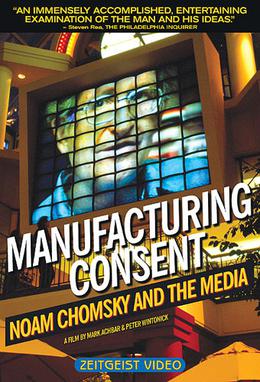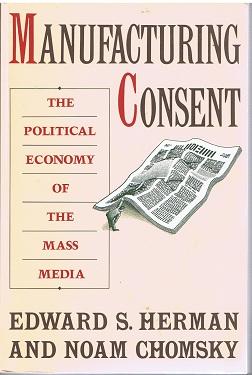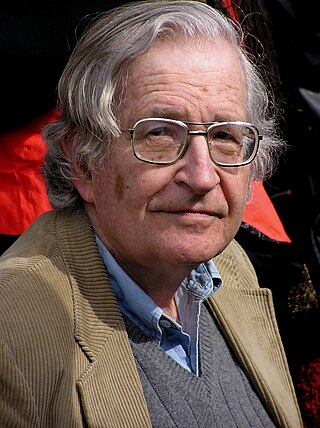Pseudo-environment
The introduction describes the human inability to interpret the world: "The real environment is altogether too big, too complex, and too fleeting for direct acquaintance" [2] between people and their environment. Instead, people construct a pseudo-environment that is a subjective, biased, and necessarily abridged mental image of the world, and to a degree, everyone's pseudo-environment is a fiction. People "live in the same world, but they think and feel in different ones." [3]
Human behavior is stimulated by the person's pseudo-environment and then is acted upon in the real world. [4] The book highlights some general implications of the interactions among one's psychology, environment, and the mass communications media.
More recent research uses the term "social constructionism" or "constructed reality" to describe what Lippmann (1922) called "pseudo-environment".
News and truth
By definition, pertinent facts are never provided completely and accurately; by necessity they are arranged to portray a certain, subjective interpretation of an event. Those who are most familiar with the greatest number of facts about a certain environment construct a pseudo-environment that aligns with their own 'stereotypes' and convey this to the public, knowingly or not, to suit their own private needs. This is inescapable human nature. Propaganda inherently requires a barrier of censorship between the event and the public. Thus mass communication media, by their nature as vehicles for informational transmission, are essentially vulnerable to manipulation.
The blame for that perceptual parallax falls not upon the mass media technology (print, radio, cinema, or, inferentially, television) or logistical concerns, but upon certain members of society who attend to life with little intellectual engagement. That causes the following:
- The buying public: the "bewildered herd" (a term here borrowed from The Phantom Public ) must pay to understand the unseen environment by the mass communications media. The irony is that although the public's opinion is important, it must pay for its acceptance. People will be selective and will buy the most factual media at the lowest price: "For a dollar, you may not even get an armful of candy, but for a dollar or less people expect reality/representations of truth to fall into their laps." The media have the social function of transmitting public affairs information and their business profit role of surviving in the market.
- Nature of news: people publish already-confirmed news that are thus less disputable. Officially-available public matters will constitute "the news" and unofficial (private) matters are unavailable, are less available, or are used as "issues" for propaganda.
- News truth and conclusion: the function of news is to signal an event, and that signalling, eventually, is a consequence of editorial selection and judgement; journalism creates and sows the seeds (news) that establish public opinion.
Manufacture of consent
Lippman argues that, when properly deployed in the public interest, the manufacture of consent is useful and necessary for a democratic society, [5] because, in many cases, "the common interests" of the public are not obvious except upon careful analysis of the collected data, a critical intellectual exercise in which most people are uninterested or are incapable of doing. [6]
That the manufacture of consent is capable of great refinements no one, I think, denies. The process by which public opinions arise is certainly no less intricate than it has appeared in these pages, and the opportunities for manipulation open to anyone who understands the process are plain enough. . . . [a]s a result of psychological research, coupled with the modern means of communication, the practice of democracy has turned a corner. A revolution is taking place, infinitely more significant than any shifting of economic power.... Under the impact of propaganda, not necessarily in the sinister meaning of the word alone, the old constants of our thinking have become variables. It is no longer possible, for example, to believe in the original dogma of democracy; that the knowledge needed for the management of human affairs comes up spontaneously from the human heart. Where we act on that theory we expose ourselves to self-deception, and to forms of persuasion that we cannot verify. It has been demonstrated that we cannot rely upon intuition, conscience, or the accidents of casual opinion if we are to deal with the world beyond our reach.
— Walter Lippmann, Public Opinion, Chapter XV
The political elite are members of the class of people who are incapable of accurately understanding, by themselves, the complex "unseen environment" wherein the public affairs of the modern state occur; thus, Lippmann proposes that a professional, "specialized class" collect and analyze data, and present their conclusions to the society's decision makers, who, in their turn, use the "art of persuasion" to inform the public about the decisions and circumstances affecting them. [7]
The Public and Its Problems , a 1927 book by John Dewey, agreed that the general public is irrational, but rejected Lippman's call for a technocratic elite. Dewey believed that in a democracy, the people are also part of the public discourse. [5] These contrasting opinions were discussed in the Lippman-Dewey Debate, which started to be widely discussed by the late 1980s in American communication studies circles. [8]
Lippmann also figured prominently in work by academics Edward S. Herman and Noam Chomsky, who cited Lippmann's advocacy of "manufacture of consent" which referred "to the management of public opinion, which Lippmann felt was necessary for democracy to flourish, since he felt that public opinion was an irrational force." [9] [10]

Manufacturing Consent: Noam Chomsky and the Media is a 1992 documentary film that explores the political life and ideas of linguist, intellectual, and political activist Noam Chomsky. Canadian filmmakers Mark Achbar and Peter Wintonick expand the analysis of political economy and mass media presented in Manufacturing Consent, a 1988 book Chomsky wrote with Edward S. Herman.

Manufacturing Consent: The Political Economy of the Mass Media is a 1988 book by Edward S. Herman and Noam Chomsky. It argues that the mass communication media of the U.S. "are effective and powerful ideological institutions that carry out a system-supportive propaganda function, by reliance on market forces, internalized assumptions, and self-censorship, and without overt coercion", by means of the propaganda model of communication. The title refers to consent of the governed, and derives from the phrase "the manufacture of consent" used by Walter Lippmann in Public Opinion (1922). The book was honored with the Orwell Award.

Avram Noam Chomsky is an American professor and public intellectual known for his work in linguistics, political activism, and social criticism. Sometimes called "the father of modern linguistics", Chomsky is also a major figure in analytic philosophy and one of the founders of the field of cognitive science. He is a laureate professor of linguistics at the University of Arizona and an institute professor emeritus at the Massachusetts Institute of Technology (MIT). Among the most cited living authors, Chomsky has written more than 150 books on topics such as linguistics, war, and politics. Ideologically, he aligns with anarcho-syndicalism and libertarian socialism.

Walter Lippmann was an American writer, reporter, and political commentator. With a career spanning 60 years, he is famous for being among the first to introduce the concept of the Cold War, coining the term "stereotype" in the modern psychological meaning, as well as critiquing media and democracy in his newspaper column and several books, most notably his 1922 Public Opinion.

The propaganda model is a conceptual model in political economy advanced by Edward S. Herman and Noam Chomsky to explain how propaganda and systemic biases function in corporate mass media. The model seeks to explain how populations are manipulated and how consent for economic, social, and political policies, both foreign and domestic, is "manufactured" in the public mind due to this propaganda. The theory posits that the way in which corporate media is structured creates an inherent conflict of interest and therefore acts as propaganda for anti-democratic elements.
The following outline is provided as an overview of and topical guide to public relations:
Edward Samuel Herman was an American economist, media scholar and social critic. Herman is known for his media criticism, in particular the propaganda model hypothesis he developed with Noam Chomsky, a frequent co-writer. He held an appointment as Professor Emeritus of finance at the Wharton School of Business of the University of Pennsylvania. He also taught at Annenberg School for Communication at the University of Pennsylvania.
Media democracy is a democratic approach to media studies that advocates for the reform of mass media to strengthen public service broadcasting and develop participation in alternative media and citizen journalism in order to create a mass media system that informs and empowers all members of society and enhances democratic values.
Propaganda, a book written by Edward Bernays in 1928, incorporated the literature from social science and psychological manipulation into an examination of the techniques of public communication. Bernays wrote the book in response to the success of some of his earlier works such as Crystallizing Public Opinion (1923) and A Public Relations Counsel (1927). Propaganda explored the psychology behind manipulating masses and the ability to use symbolic action and propaganda to influence politics, effect social change, and lobby for gender and racial equality. Walter Lippmann was Bernays' unacknowledged American mentor and his work The Phantom Public greatly influenced the ideas expressed in Propaganda a year later. The work propelled Bernays into media historians' view of him as the "father of public relations."

Noam Chomsky is an intellectual, political activist, and critic of the foreign policy of the United States and other governments. Noam Chomsky describes himself as an anarcho-syndicalist and libertarian socialist, and is considered to be a key intellectual figure within the left wing of politics of the United States.

The Anti-Chomsky Reader is a 2004 anthology book about the linguist and social critic Noam Chomsky edited by Peter Collier and David Horowitz. Its contributors criticize Chomsky's political and linguistic writings, claiming that he cherry-picks facts to fit his theories.
Manufacturing Consent: The Political Economy of the Mass Media is a 1988 book by Edward S. Herman and Noam Chomsky.
"The Responsibility of Intellectuals" is an essay by the American academic Noam Chomsky, which was published as a special supplement by The New York Review of Books on 23 February 1967.

The Public and Its Problems is a 1927 book by American philosopher John Dewey. In his first major work on political philosophy, Dewey explores the viability and creation of a genuinely democratic society in the face of the major technological and social changes of the 20th century, and seeks to better define what both the 'public' and the 'state' constitute, how they are created, and their major weaknesses in understanding and propagating their own interests and the public good. Dewey rejects a then-popular notion of political technocracy as an alternative system of governing an increasingly complex society, but rather sees democracy as the most viable and sustainable means to achieving the public interest, albeit a flawed and routinely subverted one. He contends that democracy is an ethos and an ongoing project that requires constant public vigilance and engagement to be effective, rather than merely a set of institutional arrangements, an argument he would later expand upon most influentially in his essay "Creative Democracy: The Task Before Us". The Public and its Problems is a major contribution on pragmatism in political philosophy and continued to promote discussion and debate long after its publication.
Media studies encompasses the academic investigation of the mass media from perspectives such as sociology, psychology, history, semiotics, and critical discourse analysis. The purpose of media studies is to determine how media affects society.
The following outline is provided as an overview of and topical guide to communication:
This is a list of writings published by the American author Noam Chomsky.
Alexander Edward Carey was an Australian social psychologist who analysed corporate propaganda. Carey influenced Noam Chomsky, Edward S. Herman and was called a "second Orwell in his prophesies" by Australian journalist and author John Pilger.
Media reform refers to proposed attempts to reform mass media towards an agenda which is more in tune with public needs and away from a perceived bias toward corporate, government or political biases. Media reform advocates also place a strong emphasis upon enabling those who are marginalized or semi-marginalized by their individual incomes, immutable characteristics or desperate conditions to possess access to means of publication and dissemination of information. They do not come from a concern with policy, or with a desire to democratize federal bureaucracies and regulations.
Crystallizing Public Opinion is a book written by Edward Bernays and published in 1923. It is perhaps the first book to define and explain the field of public relations.








